
In 2025, the FMCSA (Federal Motor Carrier Safety Administration) has introduced significant enhancements to its Commercial Driver’s License (CDL) review process aimed at improving roadway safety and ensuring only qualified drivers operate commercial vehicles. These updates respond to safety concerns, fraud prevention, and interstate licensing inconsistencies. This article explores what these changes entail, their implications for drivers and employers, and how to stay compliant.
Why Are CDL Reviews Being Enhanced?
The core objective of the enhanced review process is to verify the qualifications of drivers more thoroughly, especially non-domiciled drivers (those with licenses issued outside their state or country). With robust data validation, background checks, and stricter documentation, FMCSA seeks to reduce the risk of unsafe drivers on the road, streamline licensing, and eliminate fraudulent or invalid licenses.
Key Components of the 2025 CDL Review Changes
1. More Rigorous Background and Driving History Checks
States are now required to perform cross-jurisdictional checks on drivers’ records. This leverages the FMCSA’s National Driver Registry and other federal databases to validate:
- Accident and violation history
- Employment records
- License status
2. Focus on Non-Domiciled Drivers
The FMCSA has intensified scrutiny of non-domiciled CDL holders, especially those from Canada or Mexico, requiring state agencies to verify lawful immigration status and license legitimacy before issuance or renewal. Many states are discontinuing the issuance of non-domiciled CDLs altogether, transitioning affected drivers to standard state licenses.
3. Electronic Medical Certification Submission
As of June 23, 2025, medical examiners must electronically submit medical examination results directly to FMCSA. This new system replaces the traditional paper-based process, reduces errors, and enhances transparency. It also ensures the driver’s health certification is always current and accurate.
4. Drug and Alcohol Clearinghouse Integration
FMCSA’s Drug and Alcohol Clearinghouse plays a crucial role in ensuring drivers with violations do not operate until they complete mandated assessments and treatment. The clearinghouse is now actively integrated into licensing checks, making it harder for unqualified drivers to operate without proper clearance.
5. Enhanced Verification for License Application and Renewals
Applying for or renewing a CDL now involves more detailed record validation, including:
- Comprehensive background checks
- Validation of driving histories
- Verifications of medical and drug testing compliance
Employers and licensing authorities are responsible for maintaining rigorous documentation to support these reviews.
Implications for Drivers and Fleets
For Drivers:
- Prepare for longer, more detailed background check processes.
- Ensure your medical certification is submitted electronically and kept up-to-date.
- Non-domiciled drivers should verify their licensing status and consider transitioning to standard state licenses if necessary.
- Keep documentation ready for verification during employment or renewal processes.
For Employers:
- Update CDL qualification files to incorporate new requirements.
- Train staff to understand the electronic verification process.
- Maintain meticulous records of driver qualifications, medical certifications, and background checks.
- Allow additional processing time for applications, especially for non-domiciled or international drivers.
Conclusion
The 2025 enhancements to CDL reviews are designed to improve safety, combat fraud, and create a more consistent licensing system across jurisdictions. Staying ahead of these changes by preparing documentation, understanding the new procedures, and ensuring driver qualification compliance is essential for fleet safety and operational continuity.